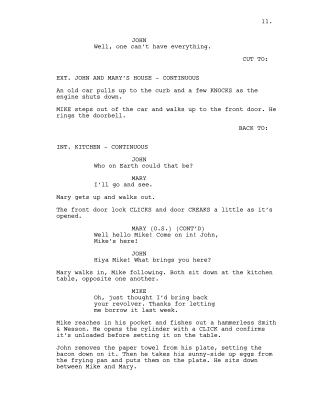Related Research Articles
Film promotion is the practice of promotion specifically in the film industry, and usually occurs in coordination with the process of film distribution. Sometimes this is called the press junket or film junket. Film promotion generally includes press releases, advertising campaigns, merchandising, franchising, media, and interviews with the key people involved in making the film, such as the film's actors and directors. This process is an important part of any release because of the inherent high financial risk; film studios will invest in expensive marketing campaigns to maximize revenue early in the release cycle. Marketing budgets tend to equal about half the production budget. Publicity is generally handled by the distributor and exhibitors.

A screenwriter is a writer who practices the craft of screenwriting, writing screenplays on which mass media, such as films, television programs, and video games, are based.
A screenplay, or script, is a written work produced for a film, television show, or video game by screenwriters. A screenplay written for television is also known as a teleplay. Screenplays can be original works or adaptations from existing pieces of writing. A screenplay is a form of narration in which the movements, actions, expressions and dialogue of the characters are described in a certain format. Visual or cinematographic cues may be given, as well as scene descriptions and scene changes.
Entertainment law, also referred to as media law, is legal services provided to the entertainment industry. These services in entertainment law overlap with intellectual property law. Intellectual property has many moving parts that include trademarks, copyright, and the "right of publicity". However, the practice of entertainment law often involves questions of employment law, contract law, torts, labor law, bankruptcy law, immigration, securities law, security interests, agency, right of privacy, defamation, advertising, criminal law, tax law, International law, and insurance law.
Market research is an organized effort to gather information about target markets and customers. It involves understanding who they are and what they need. It is an important component of business strategy and a major factor in maintaining competitiveness. Market research helps to identify and analyze the needs of the market, the market size and the competition. Its techniques encompass both qualitative techniques such as focus groups, in-depth interviews, and ethnography, as well as quantitative techniques such as customer surveys, and analysis of secondary data.
Development hell, also known as development purgatory or development limbo, is media- and software-industry jargon for a project, concept, or idea that remains in a stage of early development for a long time because of legal, technical, or artistic challenges. A work may move between many sets of artistic leadership, crews, scripts, game engines, or studios.

An independent film, independent movie, indie film, or indie movie is a feature film or short film that is produced outside the major film studio system in addition to being produced and distributed by independent entertainment companies. Independent films are sometimes distinguishable by their content and style and how the filmmakers' artistic vision is realized. Sometimes, independent films are made with considerably lower budgets than major studio films.
Filmmaking or film production is the process by which a motion picture is produced. Filmmaking involves a number of complex and discrete stages, beginning with an initial story, idea, or commission. Production then continues through screenwriting, casting, pre-production, shooting, sound recording, post-production, and screening the finished product before an audience, which may result in a film release and exhibition. The process is nonlinear, as the director typically shoots the script out of sequence, repeats shots as needed, and puts them together through editing later. Filmmaking occurs in a variety of economic, social, and political contexts around the world, and uses a variety of technologies and cinematic techniques to make theatrical films, episodic films for television and streaming platforms, music videos, and promotional and educational films.
A publicist is a person whose job is to generate and manage publicity for a company, a brand, or public figure – especially a celebrity – or for work or a project such as a book, film, or album. Publicists are public relations specialists who maintain and represent the images of individuals, rather than representing an entire corporation or business. Publicists are also hired by public figures who want to maintain or protect their image. Publicists brand their clients by getting magazine, TV, newspaper, and website coverage. Most top-level publicists work in private practice, handling multiple clients.

Screenwriting or scriptwriting is the art and craft of writing scripts for mass media such as feature films, television productions or video games. It is often a freelance profession.

Donald Paul Roos is an American screenwriter and film director.

In the performing arts industry such as theatre, film, or television, casting, or a casting call, is a pre-production process for selecting a certain type of actor, dancer, singer, or extra to land the role of a character in a script, screenplay, or teleplay. This process may be used for a motion picture, television program, documentary film, music video, play, or advertisement, intended for an audience.
A talent agent, or booking agent, is a person who finds work for actors, authors, broadcast journalists, film directors, musicians, models, professional athletes, screenwriters, writers, and other professionals in various entertainment or sports businesses. In addition, an agent defends, supports and promotes the interest of their clients. Talent agencies specialize, either by creating departments within the agency or developing entire agencies that primarily or wholly represent one specialty. For example, there are modeling agencies, commercial talent agencies, literary agencies, voice-over agencies, broadcast journalist agencies, sports agencies, music agencies and many more.
The star system was the method of creating, promoting and exploiting stars in Hollywood films from the 1920s until the 1960s. Movie studios had selected promising young actors and glamorise and create personas for them, often inventing new names and even new backgrounds. Examples of stars who went through the star system include Cary Grant, Joan Crawford, and Rock Hudson.
Turnaround in filmmaking is the use of outside assistance to resolve problems preventing a film project from completing its development phase and entering the preproduction phase. A project stuck in development phase is said to be in development hell.
A spec script, also known as a speculative screenplay, is a non-commissioned and unsolicited screenplay. It is usually written by a screenwriter who hopes to have the script optioned and eventually purchased by a producer, production company, or studio.

Roy Lee is a Korean-American film and television producer. His production company, titled Vertigo Entertainment, has a first-look deal with Lionsgate.

Cinema International Corporation (CIC) was a film distribution company started by Paramount Pictures and Universal Pictures in the early 1970s to distribute the two studios' films outside the United States – it even operated in Canada before it was considered part of the "domestic" market. During the 1970s, CIC was the "most important agent of overseas distribution" for American films. In 1981, CIC merged with United Artists' international units and became United International Pictures. The formation of CIC, and the profit-sharing arrangement that made it work, has been described as the product of "revolutionary thinking".
Film commissions are quasi-governmental, non-profit, public organizations that attract motion media production crews to shoot on location in their respective localities, and offer support so that productions can accomplish their work smoothly.
Ancillary markets are non-theatrical markets for feature films, like home video, television, Pay Per View, VOD, Internet streaming, airlines and others.
References
- ↑ Field, Syd (2005). Screenplay: The Foundations of Screenwriting. New York: Bantam Dell (Random House, Inc). p. 298. ISBN 9780385339032.
- ↑ McDonald, Paul & Wasko, Janet. (2008) “The Contemporary Hollywood Film Industry”. Malden, MA: Blackwell Publishing Ltd. p. 46-48
- ↑ McDonald Paul &, Wasko Janet (2008). The Contemporary Hollywood Film Industry. Malden, MA: Blackwell Publishing. pp. 46–47, 59.